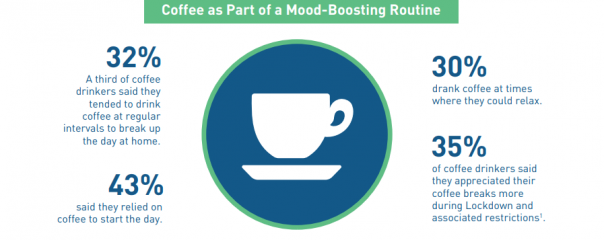
The impact of the Covid-19 pandemic has been ‘significant’ for many people across the globe resulting in people feeling a negative impact on their mood.
Maintaining a routine
This is particularly important when working or studying from home. Keeping to regular waking and sleep times, taking regular breaks and filling your day with activities and rituals that are important to you such as walking, cycling, reading, enjoying a coffee break, or setting time aside to cook a healthy meal can help.
Eating and drinking healthily
Survey findings reveal that nearly a third of people (30%) have found that eating and drinking more healthily in lockdown and associated restrictions has helped improve their mood.
This can be as simple as incorporating more fruit and vegetables into your diet, eating at regular meal times and ensuring that you stay hydrated.
Keeping in touch with friends and loved ones
This can be done via a simple text message, scheduling regular calls, or making plans to meet up for a walk (where permitted). Keeping in touch with loved ones can be helpful in lifting moods and distracting yourself from negative thought patterns.
Keeping active
Consumer survey findings show that over a quarter found taking some form of regular exercise helpful in lifting their mood. If you’re unable to access gym classes, an alternative approach could be as simple as going for a walk or run, or even following a virtual workout video.
Spending time in nature
Research has found that people who spend at least 120 minutes in nature per week are more likely to report good health and wellbeing, than those with no contact. Combining the outdoors with your daily exercise is an easy way of maximising nature’s calming effects.
Taking things slow and being mindful
Remembering to take a break can be particularly helpful during busy days to help avoid feeling overwhelmed or stressed. Taking a coffee break, for instance, and focussing on the aroma and taste when drinking can be a great way to practice mindfulness and being present.
Recognising what can and cannot be controlled
This is particularly important with regards to changes to your environment and negative news items. Assess what aspects of your environment are in your control and know that you can positively benefit your wellbeing by focusing on these.
Maintaining a healthy relationship with social media
Although a highly useful way to stay connected with friends and the world around us, social media can also expose users to a lot of negativity, particularly when it comes to daily news.
Restricting time spent on social media and limiting notifications, can help to reduce potential exposure to less positive content.